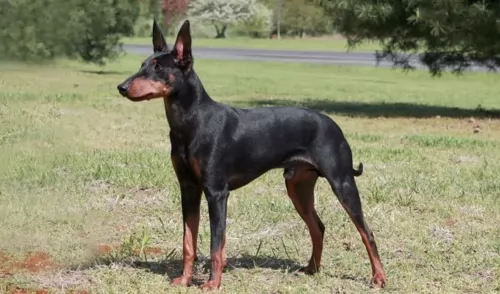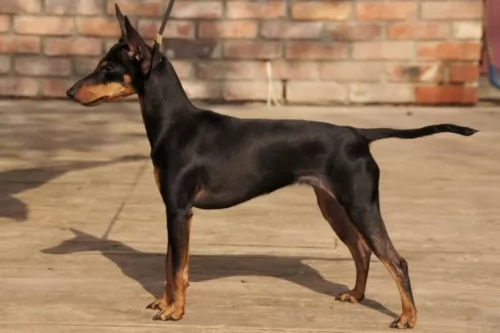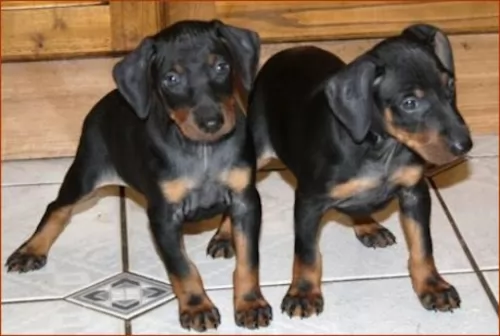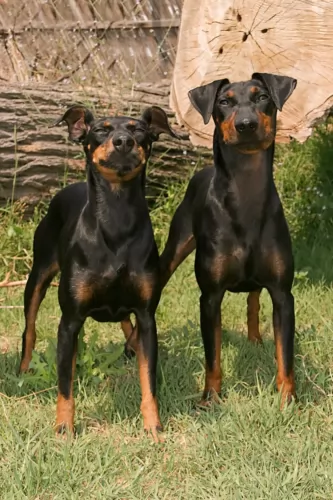 Petzlover
Petzlover Manchester Terrier is originated from United Kingdom but Schweizer Laufhund is originated from Switzerland. Manchester Terrier may grow 29 cm / 11 inches shorter than Schweizer Laufhund. Manchester Terrier may weigh 16 kg / 35 pounds lesser than Schweizer Laufhund. Manchester Terrier may live 3 years more than Schweizer Laufhund. Manchester Terrier may have less litter size than Schweizer Laufhund. Both Manchester Terrier and Schweizer Laufhund requires Low Maintenance.
Manchester Terrier is originated from United Kingdom but Schweizer Laufhund is originated from Switzerland. Manchester Terrier may grow 29 cm / 11 inches shorter than Schweizer Laufhund. Manchester Terrier may weigh 16 kg / 35 pounds lesser than Schweizer Laufhund. Manchester Terrier may live 3 years more than Schweizer Laufhund. Manchester Terrier may have less litter size than Schweizer Laufhund. Both Manchester Terrier and Schweizer Laufhund requires Low Maintenance.
 Looking much like the Black and Tan Terrier, the Manchester Terrier is a dog that was actually developed from the Black and Tan, which is the oldest known breed of terrier.
Looking much like the Black and Tan Terrier, the Manchester Terrier is a dog that was actually developed from the Black and Tan, which is the oldest known breed of terrier.
In the United States there are 2 varieties of the Manchester Terrier — the Toy and the Standard but in the UK the 2 sizes are classified as different breeds - the English Toy Terrier and the Manchester Terrier.
The dog was first bred in the 19th century to wipe out rats and mice, originating from Manchester, England. This is an old dog breed, gaining the nickname of the Gentleman's Terrier because of its dignified looks and personality.
After the 2nd World War, the numbers of the dog dropped and this spurred the kennel club to list it as a vulnerable native breed, in danger of extinction. It was in 1937 that the British Manchester Terrier Club was formed.
 The Schweizer Laufhund is a breed born in Switzerland and sought after by the French and the Italians for their skill at hunting small mammals, especially hare. Mercenaries brought scent hounds from France to Switzerland and cross bred them with the Schweizer Laufhund, thereby influencing and changing the native breed.
The Schweizer Laufhund is a breed born in Switzerland and sought after by the French and the Italians for their skill at hunting small mammals, especially hare. Mercenaries brought scent hounds from France to Switzerland and cross bred them with the Schweizer Laufhund, thereby influencing and changing the native breed.
In 1882 it was established that within the breed of “Swiss Hound” (Schweizer Laufhund) there were five different varieties. At this time a standard was written for each of these five different types. By 1909 the standards were revisited and revised, eliminating the hound of Thurgovie. Then in 1933 it was decided that one standard would cover all the varieties of the Schweizer Laufhund.
The Schweizer Laufhund was a line used to develop many different scent hounds. They are used almost exclusively as hunting dogs and not as family companion dogs. St. Hubert Jura Hound, the rare ancient variety, is still in the hunting parties of Canada and France. The breed existed before any dog breeding written records were kept. In Switzerland from the middle ages on, the Schweizer Laufhund was the only hunting dog in the country until recent times.
Even though they didn’t have any popularity until the European nobility became enamored of them in the middle ages, it is thought by some that they date back to the Roman Empire. In actuality most of their pre- Swiss history has been lost. We do know that through the years the breed has been influenced by cross breeding with Austrian, German and French scent hounds.
He is not recognized by the larger kennel clubs such as AKC or UKC, but by some rare breed associations. The dogs that remain today in the United States, Canada and Europe are still mainly owned by either active or retired hunters. Despite their great personalities, they are still not numerous among family pets.
 The Manchester Terrier is a small, smooth haired dog with a black and tan coat and a head with a fairly long muzzle, small bright eyes, largish erect ears and a deep chest.
The Manchester Terrier is a small, smooth haired dog with a black and tan coat and a head with a fairly long muzzle, small bright eyes, largish erect ears and a deep chest.
The body is lean and muscular and the tail, where once docked, now tends to be left long. In the toy sized dog you will find him standing at roughly 25 – 30cm in height and he will weigh between 2 to 4kg. The standard sized dog will be slightly taller and heavier and weigh in the region of 8kg.
You can expect between 2 – 4 puppies from a breeding pair.
Feisty, energetic, alert and intelligent are some of the words which describe the Manchester Terrier. Like any other dog, training and socialization will make him a splendid pet, obedient and amicable among people.
He is loving and loyal, courageous and feisty and guaranteed to make you an eager-to-please pet. He can adapt to life in the city or countryside, but is going to need plenty of exercise wherever you keep him as a pet.
 A medium sized dog with good endurance and strength. Its head is lean, and its muzzle is long making this a very noble looking breed. Each of the 5 varieties has some of its own characteristics. They all have short, fine hairs on their ears and heads and longer hairs on their legs and back.
A medium sized dog with good endurance and strength. Its head is lean, and its muzzle is long making this a very noble looking breed. Each of the 5 varieties has some of its own characteristics. They all have short, fine hairs on their ears and heads and longer hairs on their legs and back.
• Bernese – White with a black saddle or black patches and tan on the ears and face.
• Lucernese – Because they have white and black hair mixed across their bodies, they appear to be “blue”.
The Schweizer Laufhund come in miniature and standard sizes fitting into the same standard. Weight has a lot to do with the gender and height of the individual dog, they are longer than they are tall. As a scent hound, the breed is muscular and sturdy. They carry their long tails in a slight curve with a taper at the end.
Despite the different colors in the different varieties all of the breed have black noses, long droopy ears, and oval, brown eyes. They have a soft, calm and gentle facial expression.
 The Manchester Terrier has so many good qualities that make him such a good pet. Low maintenance, he is clean and well groomed to look at. He is also a healthy dog breed, nice and active and low maintenance.
The Manchester Terrier has so many good qualities that make him such a good pet. Low maintenance, he is clean and well groomed to look at. He is also a healthy dog breed, nice and active and low maintenance.
This little dog is willing to come into your home and heart. He will make you a wonderful pet and friend for as long as 15 years if you take special care of him.
 1Children friendliness - they can be very gentle and loving with children. Toddlers might remind them of prey, however.
1Children friendliness - they can be very gentle and loving with children. Toddlers might remind them of prey, however.
4.Learning ability -their learning ability is high, but they can be very stubborn.
 This dog breed is fairly healthy and can reach a good age if looked after well. Every dog though, can be affected by a number of inheritable genetic disorders.
This dog breed is fairly healthy and can reach a good age if looked after well. Every dog though, can be affected by a number of inheritable genetic disorders.
Glaucoma is a common genetic condition in Terrier breeds, including the Manchester Terrier. Secondary glaucoma, which is known as lens luxation is brought about when there is excessive pressure in the eyeball. The lens of the eye is put out of alignment. Most times surgery is the solution.
Von Willebrand's Disease is a blood disorder that affects the clotting process. A dog with this disease will have bleeding gums, continuous bleeding after surgery and sometimes blood in the stool. It’s a disease which can’t be cured but it can be managed with treatments.
 There are a few health issues that the Schweizer Laufhund is prone to. As an ancient breed there is not a lot of genetic evidence of breed health issues but there is more recent reporting.
There are a few health issues that the Schweizer Laufhund is prone to. As an ancient breed there is not a lot of genetic evidence of breed health issues but there is more recent reporting.
• PRA (Progressive Retinal Atrophy) – hereditary – can result in blindness.
• Ectropion and Entropion – eyelid misalignments either inward or outward. Can be corrected with surgery.
 Low maintenance, the Manchester Terrier will only require a brushing once or twice a week. Check his eyes and ears for infections, clip his nails and brush his teeth 2 or 3 times a week.
Low maintenance, the Manchester Terrier will only require a brushing once or twice a week. Check his eyes and ears for infections, clip his nails and brush his teeth 2 or 3 times a week.
The Manchester Terrier is a lean, muscular dog and you want to be sure to keep him that way. If you feed him commercially manufactured food, make sure that it is one of the high quality brands – food which is packed full of vitamins and minerals to ensure the health of your dog.
Any packaged food you buy should be appropriate to the dog’s age and his activity levels. You won’t be doing your dog a favor by feeding him treats that you enjoy such as chocolate, coffee, peanuts, raisins, grapes and onions.
Dogs want simple food that don’t change much. Keeping things simple prevents upset stomachs. Give him some wholesome home-made food occasionally to add into his dry kibble. This can be boiled chicken, brown rice or pasta and some cooked or raw vegetables such as potatoes, carrots and spinach. Some raw meat added in from time to time can also do wonders for your dog. Make sure he has access around the clock to fresh, cool water.
The Manchester Terrier wants lots of exercise, and apart from him having his regular daily walks, he will need runs off the leash in the park. If you go cycling for instance, he will readily run beside you.
 . Feeding the puppy – as an active working breed they should be fed a high quality active or working breed kibble formula.
. Feeding the puppy – as an active working breed they should be fed a high quality active or working breed kibble formula.
2.Feeding the adult - the adult should be fed the same active or working breed formula, only in an adult formulation.
4. Games and Exercises – this active breed does require a lot of daily exercise. Take them on at least one good, quick walk per day and give them a fenced yard to play in. They love hunting training and field trials along with activities like barn hunt. They love to run alongside as you bike or jog.